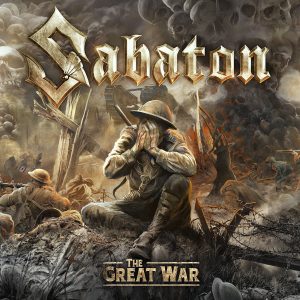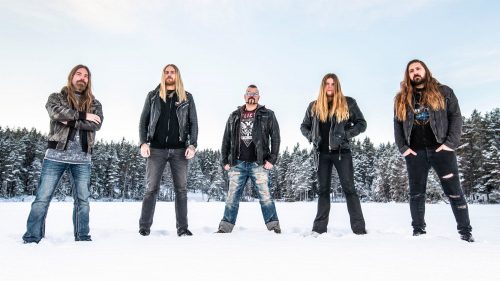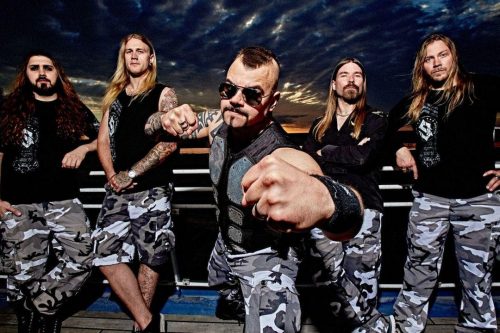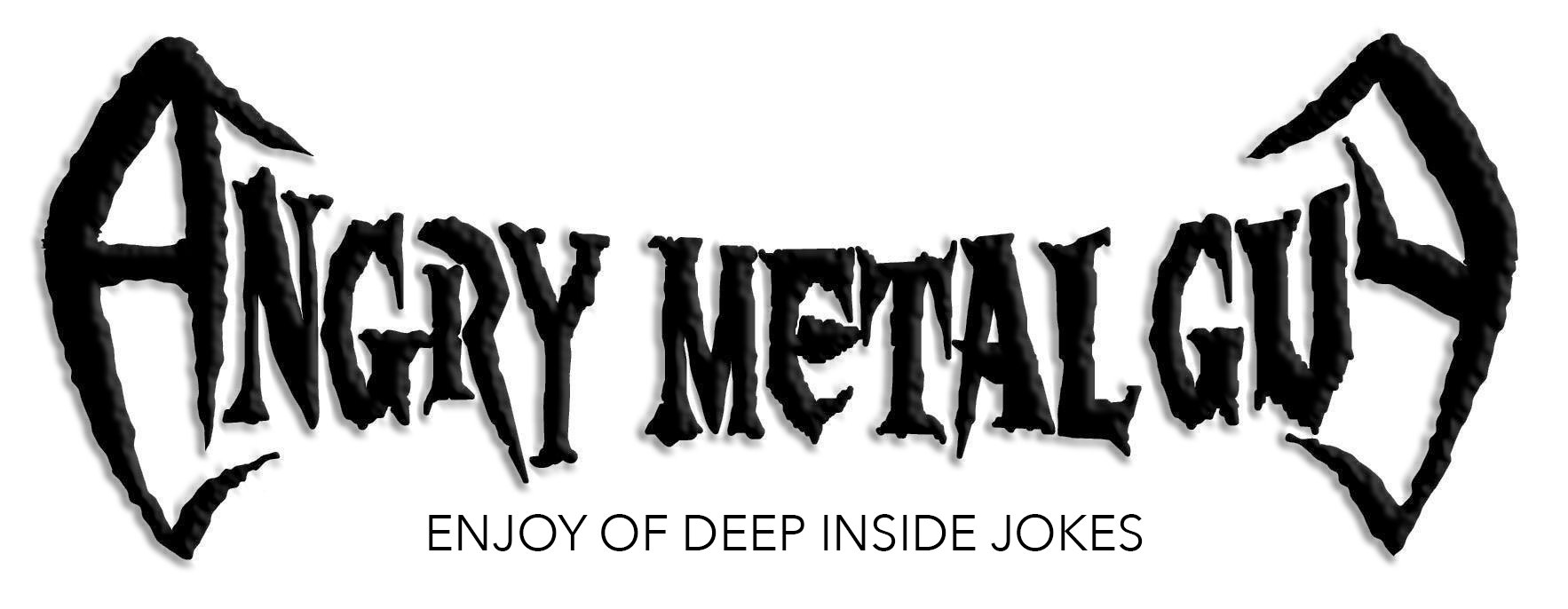 Sabaton has made singing about war nearly as lucrative a proposition as Motley Crüe made singing about their dicks. And unlike their cock rocking elder’s chosen idiom, nation on nation violence translates far better into the metal ethos. Tales of bravery, battle and death are the bloody blocks upon which metal was originally built, and it drinks deeply of that Bathoryian tub to this day. Since 2005 Sabaton has functioned as the house band for the military-industrial complex, churning out platter after platter about the horrors and glories of war, and album number nine, The Great War is another with which to plug the breech. As the title suggests, this one focuses on World War I with songs about legendary figures like Sergeant York and the Red Baron. If you’ve heard any Sabaton release, you’re properly braced for their proprietary Wall o’ Sound™ made up of bigger-than-life symphonics, chunky riffs and the raging, camo-clad machismo channeled through Joakim Brodén’s baritone vocals. Sun Tzu would lament the ridiculous predictability of the band’s battle plan, but hey, when the cannon’s arockin’ who comes aknockin’?
Sabaton has made singing about war nearly as lucrative a proposition as Motley Crüe made singing about their dicks. And unlike their cock rocking elder’s chosen idiom, nation on nation violence translates far better into the metal ethos. Tales of bravery, battle and death are the bloody blocks upon which metal was originally built, and it drinks deeply of that Bathoryian tub to this day. Since 2005 Sabaton has functioned as the house band for the military-industrial complex, churning out platter after platter about the horrors and glories of war, and album number nine, The Great War is another with which to plug the breech. As the title suggests, this one focuses on World War I with songs about legendary figures like Sergeant York and the Red Baron. If you’ve heard any Sabaton release, you’re properly braced for their proprietary Wall o’ Sound™ made up of bigger-than-life symphonics, chunky riffs and the raging, camo-clad machismo channeled through Joakim Brodén’s baritone vocals. Sun Tzu would lament the ridiculous predictability of the band’s battle plan, but hey, when the cannon’s arockin’ who comes aknockin’?
Opener “The Future of Warfare” quickly assures that nothing has changed at Fort Sabaton. It’s the same symphonic power metal cleverly disguised with amped up riffs and toughened vocals. The quasi-operatic choral segments are there to add bombast and grandeur and General Brodén narrates it all with his usual panache. It’s the very model of the band’s style and as such it isn’t all that gripping, as we’ve heard this exact song many times before. Things improve on “Seven Pillars or Wisdom” which while still standard issue, has enough chest thumping bravado to get the blood moving. It isn’t until “The Attack of the Dead Men” that The Great War really goes into attack mode, with a slightly different sound than usual, still bombastic as all get out, but perhaps a tad more epic than usual. The chorus is almost like a heroic Russian folk song, and it really works, sounding serious, larger-than-life and mega-catchy. I want an album of this stuff.
This isn’t it, as classic Sabaton writing prevails, though there are scattered moments that exceed expectations, like “The Red Baron” which is way more rocked out than usual, approaching Avantasia levels of hard rock glory. The Hammond organ adds a hefty Deep Purple-esque glean and this is one of the most fun songs the band’s ever written. The title track and “A Ghost in the Trenches” both show the best of their style with catchy, anthemic moments writ large, but the other tracks are less stirring, like “Devil Dogs,” which feels recycled from earlier works. The album’s epic track, “The End of the War to End All Wars” also falls a bit flat, lacking the emotional gravitas such a heavy topic requires. Things wind out with a haunting take on the classic war remembrance poem turned ballad “In Flanders Fields,” and the tragic, forlorn mood is respectfully conveyed, ending things on a poignant note while offering real world perspective to counter the gung-ho, pro-war shtick the album revels in.

The Great War is a short, tight 38-plus minutes and almost all the songs are under 4 minutes. This makes for a fast, hit and run style album that works in the band’s favor. No song overstays its welcome and things are kept moving at a brisk pace. While the writing is inconsistent, there are no complete duds or mandatory skips and it’s an easy platter to blast through. As always, Brodén’s distinctive vocals set the table for the Sabaton show and he does his usual solid job, even extending himself a bit on cuts like “The Attack of the Dead Men” and especially on “The End of the War to End All Wars,” where he dabbles in slightly darker, more somber singing. The backing music is solid enough and there are some particularly ear-catching guitar harmonies and solos scattered across the tracks courtesy of Chris Rörland and Tommy Johansson. I could do without the nearly omnipresent keyboard/choral grenades, but such is life in the trenches.
The Great War is another well-executed Sabaton offering sure to please fans. It’s a fun, energetic listen with little deviation from the well worn tank tracks the band has established, and they prove once again they can keep writing the same album and still make it entertaining. I’ve experienced battle fatigue with their style since their crowning achievement on Carolus Rex, but this is an enjoyable spin nonetheless. Back to the front, doughboys!
Rating: 3.0/5.0
DR: 7 | Format Reviewed: 277 kbps mp3
Label: Nuclear Blast
Websites: sabaton.net | sabaton.bandcamp.com | facebook.com/sabaton
Releases Worldwide: July 19th, 2019
Dr. A.N. Grier
Remember me? I’m that guy that gave Sabaton’s The Last Stand a 3.5/5.0. Why would I do such a thing? Because I enjoyed it, dick. Though I enjoyed it too much in many of your ears/eyes. But you can’t tell me you haven’t experienced a “right place, right time” scenario. King Diamond’s Puppet Master, Dimmu Borgir’s Puritanical Euphoric Misanthropia, Slipknot’s Vol. 3: (The Subliminal Verses), Swashbuckle’s Back to the Noose, Machine Head’s Through the Ashes of Empires, and Metallica’s ReLoad are those albums for me.1 And, like the others, Sabaton’s 2016 release hit me like a bag of bricks. It’s not Carolus Rex level perfection but, The Last Stand is a great album. So, you can all suck my balls. And, if you didn’t get a chance to in 2016, my balls are back for your sucking pleasure as I double-up2 with Steel for another crack3 at Sabaton. But where will The Great War stand compared to the rest of the band’s catalog? Probably somewhere akin to anything from Primo Victoria to The Last Stand?4
Like my balls on a hot summer day5, Joakim Brodén’s vox drag and grovel like WWI tanks on opener “The Future of Warfare.” Though a bit different from the Brodén sound we know, there still remains the signature build and massiveness expected of Sabaton. Not to mention, more of the (obvious) war-like themes on this new record. Though I’m no match for Steel‘s buffness on the topic, I come from a long line of military men fighting against brothers in the American Civil War and uniting with neighbors for the “greater good” in WWI and WWII. Whether you are for or against, or even care about, our history, Sabaton—as always—is back to preserve every soldier’s memory and put their stories into a musical style intended for epic, war-themed storytelling.
Following the opener, we step into that signature Sabaton sound with “Seven Pillars of Wisdom.” Fun and fast-paced, this thing has catchy verses and a chorus that gets bigger with repetition. In the middle, there’s that classic lull that allows for solo work and a build back to the closing chorus. It may be as predictable as a ’90s romantic comedy but it still gets the job done. “Devil Dogs,” “Great War,” and “A Ghost in the Trenches” are also classic Sabaton ditties. “Devil Dogs” cruises at 90 mph, tearing through an upbeat tempo and filled with punchy, downbeat emphases in the pre-chorus and chorus. “A Ghost in the Trenches” feels like getting hit by the flat side of an oar, short of delivering a punchline,6 yet it still has a massive payoff worth something. “Great War,” with its four-plus-minute runtime, feels like it should be the Sabaton epic of the album. But its heavy melodics and movie-soundtrack choirs fall short of making it the beast of the album.

Epically, the back-to-back “Fields of Verdun” and “The End of the War to End All Wars” take the title. But in different ways. Though a mere three minutes in length, “Fields of Verdun”—somehow—unleashes the heartfelt emotion of the longest battle of WWI. The verses are heartbreaking and the chorus is to die for. “The End of the War to End All Wars,” however, is the album’s bombastic finisher. Take the approach of “Great War” and inject piano, strings, and even bigger choirs. The result is pure build and the outcome is an early 1900’s propaganda piece with some serious balls.7
Grier favorites have to be “Red Baron,” “82nd All the Way,” and “The Attack of the Dead Men.” At first, I thought I hated “Red Baron.” And I kinda did. Its odd, silent-movie harpsichord shit damn-near broke my eyebrows. And, the fact that you can hear it pulse throughout the song—not to mention the solo in the middle—only made it worse. But, after a couple of spins, I find it masterful and the song is a surprising treasure trove. But “82nd All the Way” and “The Attack of the Dead Men” are my absolute favorites of The Great War. The former is a groovy number that follows Sergeant York to the German trenches of Hill 223. It has one of the best choruses of the album and it only gets bigger and better as the song progresses. “The Attack of the Dead Men” borrows the almost-staccato-like, stop-and-go vocal approach of the opener, but does it better. This song pulls to the front and stakes claim to the best chorus on the album. Its punchy deliberateness, and emotion up the wazoo, make it one of my favorite Sabaton songs ever.
As the acapella, full-choir singing of John McCrae’s poem, “In Flanders Fields,” comes to an end, I find myself pleased with The Great War. It’s as fun as Heroes and The Last Stand, with a similar, digestible length. It’s not without its flaws and some of the safer pieces (“Great War,” “Seven Pillars of Wisdom,” and “A Ghost in the Trenches”) need reworking or elimination. But, like all Sabaton records post-Coat of Arms, I can spin it anytime, anywhere and enjoy it. And, if you want something even more epic and informational, grab the album’s counterpart, The Great War – History Edition, and learn some shit that’ll make you wonder if the movie 300 could use more dramatics. Now that the band has done pretty much everything, what’s next for these Swedes? The Bad Bitches of History, perhaps?8
Rating: 3.0/5.0

















